
The SMU Tower Center Sun & Star Program on Japan and East Asia partnered with the SMU Mission Foods Texas-Mexico Center for an all-day discussion of the Japan-Mexico-Texas economic and political relationship Jan. 30.
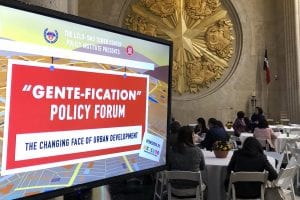 The SMU Tower Center and Latino Center for Leadership and Development co-hosted a policy forum discussing “gente-fication” and various policy solutions that could reduce the impact of the rising costs of housing and amenities for low-income locals. HCM Tower Scholar Destiny Rose Murphy wrote about what she learned.
The SMU Tower Center and Latino Center for Leadership and Development co-hosted a policy forum discussing “gente-fication” and various policy solutions that could reduce the impact of the rising costs of housing and amenities for low-income locals. HCM Tower Scholar Destiny Rose Murphy wrote about what she learned.
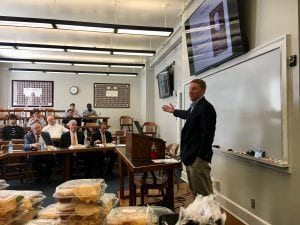
Benjamin Powell, director of the Free Market Institute and professor of economics at Texas Tech University, visited the SMU Tower Center to give a lecture on why free migration makes economic sense.
The economic case for migration is simple: the more freely the factors of production, such as goods and services, natural resources, and labor, can move, the more efficient and productive the economy will be. Obviously, natural resources cannot be moved, which means the movement of labor is important in order to harness as much creative and productive potential as possible.
The SMU Tower Center Sun & Star Japan-East Asia Program hosted the discussion “Japan-U.S. Relations in the Changing World” featuring Naoyuki Agawa, Distinguished Visiting Professor of Law at Doshisha University in Kyoto, Japan, Jan. 30. SMU Junior and HCM Tower Scholar Destiny Rose Murphy wrote about her experience at the event.
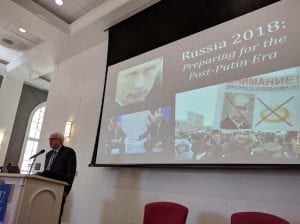
Spoiler alert: Vladimir Putin will win the 2018 Russian presidential election (if it can even be called an election), but is his support really at an all-time high? Former U.S. Ambassador to Russia John Beyrle, the final guest of the Russia Series, visited the SMU Tower Center to discuss Putin’s standing in Russia and world politics. He started his lecture with three reasons why Russia is still, and always will be, a crucial component of global politics:
More than 650,000 Rohingya people have fled the Rakhine State of Myanmar across the border to Bangladesh since a security crackdown began in August 2017. U.S. Secretary of State Rex Tillerson referred to the actions of the Myanmar armed forces as ethnic cleansing. This is the fourth wave of forced migration of the Rohingya population since the country began its democratization process in 2011. Dr. Jacques Bertrand, professor of political science at the University of Toronto, discussed the roots of this crisis and what might happen next at the SMU Tower Center Jan. 10.
To understand the resentment and hatred the Burmese feel toward the Rohingya, Bertrand argues we first need to understand colonial Burma. The British Empire began to colonize Burma in 1824.
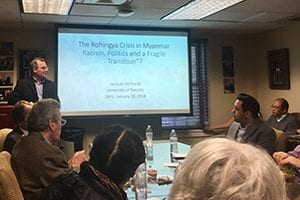
The Rakhine state was the first land to be annexed into the empire, and therefore experienced the highest levels of immigration of people from British India. These Indians became landowners and then continued to hire more Indians to work their land. The Burmese responded to the influx of Indian immigrants with a growing sense of nationalism and xenophobic sentiments.
Burma gained independence from the United Kingdom in 1948, and according to Bertrand, it was during this period that the Muslim Indian population in the Rakhine State identified themselves as Rohingya. The Rohingya enjoyed credibility in the democracy of the 1950s, but lost all their rights under the military regime of Ne Win in 1962. Ne Win attempted to remove all Indians from Burma in 1963-1964, claiming that they were foreigners and remnants of colonial rule. The Rohingya were then excluded from citizenship with the adoption of the 1982 citizenship law. By this law, residents had to prove they were living in Burma before colonial rule (1824) to gain citizenship. The law only recognized 135 ethnicities as national races, excluding several other minority groups from citizenship as well.
North Korea has developed nuclear capabilities that the United States assumed was out of reach for the isolated country in such a short period of time. Its advancement has changed the dialogue of policy toward the country for both the United States and China. Ken Jimbo, associate professor at Keio University, visited the SMU Tower Center to discuss Asia’s nuclear challenge in the first event of the semester Jan. 8.
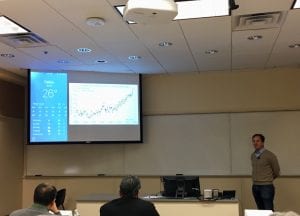
Jonah Busch, Senior Fellow at the Center for Global Development, gave a lecture at the SMU Tower Center on the impact of the U.S. leaving the Paris Climate Agreement Dec. 8.
The Paris Agreement is a universal global climate deal that allows each country to determine its own pledge to reduce carbon emissions, with the goal to limit climate change to below 2 degrees Celsius. The agreement, first established at the Paris climate conference in 2015 and ratified in 2016, is now signed by every country (except for the United States) and has been ratified by 170 countries. President Trump announced the United States withdrawl from the agreement in June.